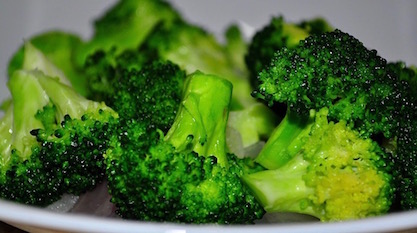 Intelligent Design
Intelligent Design
 Life Sciences
Life Sciences
 Medicine
Medicine
Broccoli and the Myth of Junk DNA


This brings the question of supposed “Junk DNA” home — home, literally, to your family’s dinner table. A class of supposed detritus in the genome, long non-coding RNAs, or “lncRNAs,” looks now as if it plays a role in the development of prostate cancer. New evidence on the point was published in the Journal of Nutritional Biochemistry, and highlighted by Science Daily. It shows
how these lncRNAs, which were once thought to be a type of “junk DNA” of no particular value or function, may instead play a critical role in triggering cells to become malignant and spread.
Growing evidence shows that lncRNAs, which number in the thousands, have a major role in cell biology and development, often by controlling what genes are turned on, or “expressed” to carry out their genetic function. Scientists now believe that when these lncRNAs are dysregulated they can contribute to multiple disease processes, including cancer.
The lncRNAs are also of special interest, researchers say, because they are so highly cell- and tissue-specific.
Unlike many chemotherapeutic drugs that affect healthy cells as well as malignant ones and can cause undesired side effects, the control of lncRNAs may offer a new way to specifically prevent or slow the progression of malignant cells. [Emphasis added.]
This in turn helps to explain why broccoli, like other cruciferous vegetables rich in the compound sulforaphane, is rightly known as a cancer-fighting food.
[T]his research showed that one lncRNA, called LINC01116, is upregulated in a human cell line of prostate cancer, but can be decreased by treatment with sulforaphane.
Nor is it only prostate cancer that’s in the balance here.
That same lncRNA, they noted, is also overexpressed in studies of several other types of cancer, including brain, lung and colon cancer. Some other lncRNAs have been found at higher levels in breast, stomach, lung, prostate cancer and chronic lymphocytic leukemia.
The Abstract frames it this way:
Long noncoding RNAs (lncRNAs) have emerged as important in cancer development and progression. The impact of diet on lncRNA expression is largely unknown. Sulforaphane (SFN), obtained from vegetables like broccoli, can prevent and suppress cancer formation. Here we tested the hypothesis that SFN attenuates the expression of cancer-associated lncRNAs. We analyzed whole-genome RNA-sequencing data of normal human prostate epithelial cells and prostate cancer cells treated with 15 μM SFN or dimethylsulfoxide. SFN significantly altered expression of ~100 lncRNAs in each cell type and normalized the expression of some lncRNAs that were differentially expressed in cancer cells. SFN-mediated alterations in lncRNA expression correlated with genes that regulate cell cycle, signal transduction and metabolism. LINC01116 was functionally investigated because it was overexpressed in several cancers, and was transcriptionally repressed after SFN treatment. Knockdown of LINC01116 with siRNA decreased proliferation of prostate cancer cells and significantly up-regulated several genes including GAPDH (regulates glycolysis), MAP1LC3B2 (autophagy) and H2AFY (chromatin structure). A four-fold decrease in the ability of the cancer cells to form colonies was found when the LINC01116 gene was disrupted through a CRISPR/CAS9 method, further supporting an oncogenic function for LINC01116 in PC-3 cells. We identified a novel isoform of LINC01116 and bioinformatically investigated the possibility that LINC01116 could interact with target genes via ssRNA:dsDNA triplexes. Our data reveal that chemicals from the diet can influence the expression of functionally important lncRNAs, and suggest a novel mechanism by which SFN may prevent and suppress prostate cancer.
It’s another illustration of something we’ve observed many times before. “Junk DNA” was a straight inference from Darwinian theory: a random process naturally leaves heaps of meaningless trash lying around. What do you do with trash? Obviously, you sweep it into the garbage can without giving it another thought. What you don’t do is investigate its significance.
Against this idea, advocates of intelligent design countered that if ID was the better interpretation of biology, then the amount of junk in DNA should be minimized. What appeared to be “junk” should, then, be actively investigated for function. Well, as readers of our work at Evolution News know well, ID’s prediction is confirmed and reconfirmed by new science on what seems like an almost weekly basis.
Not realizing the vital role that noncoding “junk” sequences could play in maintaining health, orthodox Darwinism was a science stopper. If researchers had paid really strict heed to orthodox evolutionary thinking only, we would never fully know why broccoli is so good for you.
Photo credit: U.S. Department of Agriculture, via Oregon State University.
